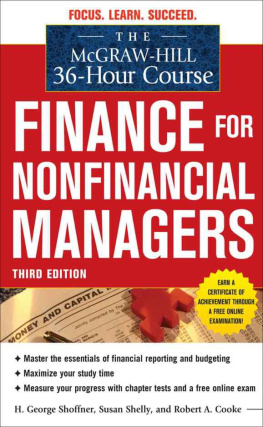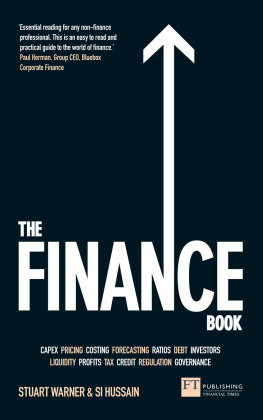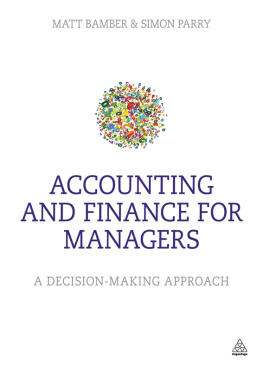The McGraw-Hill 36-Hour Course: Finance for Nonfinancial Managers
Other Books in The McGraw-Hill 36-Hour Course Series
THE MCGRAW-HILL 36-HOUR COURSE: ACCOUNTING
THE MCGRAW-HILL 36-HOUR COURSE: BUSINESS WRITING AND COMMUNICATION, 2E
THE MCGRAW-HILL 36-HOUR COURSE: OPERATIONS MANAGEMENT
THE MCGRAW-HILL 36-HOUR COURSE: ORGANIZATIONAL DEVELOPMENT
THE MCGRAW-HILL 36-HOUR COURSE: ONLINE MARKETING
THE MCGRAW-HILL 36-HOUR COURSE: PRODUCT DEVELOPMENT
THE MCGRAW-HILL 36-HOUR COURSE: PROJECT MANAGEMENT, 2E
THE MCGRAW-HILL 36-HOUR COURSE: REAL ESTATE INVESTING, 2E
THE MCGRAW-HILL 36-HOUR COURSE: SIX SIGMA
The McGraw-Hill 36-Hour Course: Finance for Nonfinancial Managers
Third Edition
H. George Shoffner
Susan Shelly
Robert A. Cooke


Copyright 2011 by Rupert Scofield. All rights reserved. Except as permitted under the United States Copyright Act of 1976, no part of this publication may be reproduced or distributed in any form or by any means, or stored in a database or retrieval system, without the prior written permission of the publisher.
ISBN: 978-0-07-175947-2
MHID: 0-07-175947-6
The material in this eBook also appears in the print version of this title: ISBN: 978-0-07-174955-8, MHID: 0-07-174955-1.
All trademarks are trademarks of their respective owners. Rather than put a trademark symbol after every occurrence of a trademarked name, we use names in an editorial fashion only, and to the benefit of the trademark owner, with no intention of infringement of the trademark. Where such designations appear in this book, they have been printed with initial caps.
McGraw-Hill eBooks are available at special quantity discounts to use as premiums and sales promotions, or for use in corporate training programs. To contact a representative please e-mail us at bulksales@mcgraw-hill.com.
This publication is designed to provide accurate and authoritative information in regard to the subject matter covered. It is sold with the understanding that neither the author nor the publisher is engaged in rendering legal, accounting, securities trading, or other professional services. If legal advice or other expert assistance is required, the services of a competent professional person should be sought.
From a Declaration of Principles Jointly Adopted by a Committee of the American Bar Association and a Committee of Publishers and Associations
TERMS OF USE
This is a copyrighted work and The McGraw-Hill Companies, Inc. (McGraw-Hill) and its licensors reserve all rights in and to the work. Use of this work is subject to these terms. Except as permitted under the Copyright Act of 1976 and the right to store and retrieve one copy of the work, you may not decompile, disassemble, reverse engineer, reproduce, modify, create derivative works based upon, transmit, distribute, disseminate, sell, publish or sublicense the work or any part of it without McGraw-Hills prior consent. You may use the work for your own noncommercial and personal use; any other use of the work is strictly prohibited. Your right to use the work may be terminated if you fail to comply with these terms.
THE WORK IS PROVIDED AS IS. McGRAW-HILL AND ITS LICENSORS MAKE NO GUARANTEES OR WARRANTIES AS TO THE ACCURACY, ADEQUACY OR COMPLETENESS OF OR RESULTS TO BE OBTAINED FROM USING THE WORK, INCLUDING ANY INFORMATION THAT CAN BE ACCESSED THROUGH THE WORK VIA HYPERLINK OR OTHERWISE, AND EXPRESSLY DISCLAIM ANY WARRANTY, EXPRESS OR IMPLIED, INCLUDING BUT NOT LIMITED TO IMPLIED WARRANTIES OF MERCHANTABILITY OR FITNESS FOR A PARTICULAR PURPOSE. McGraw-Hill and its licensors do not warrant or guarantee that the functions contained in the work will meet your requirements or that its operation will be uninterrupted or error free. Neither McGraw-Hill nor its licensors shall be liable to you or anyone else for any inaccuracy, error or omission, regardless of cause, in the work or for any damages resulting there from. McGraw-Hill has no responsibility for the content of any information accessed through the work. Under no circumstances shall McGraw-Hill and/or its licensors be liable for any indirect, incidental, special, punitive, consequential or similar damages that result from the use of or inability to use the work, even if any of them has been advised of the possibility of such damages. This limitation of liability shall apply to any claim or cause whatsoever whether such claim or cause arises in contract, tort or otherwise.
CONTENTS
PREFACE
My friend, Ralph, went to college and majored in history (and extracurricular activities). With sheepskin in hand, he applied for many chairman-of-the-board positions and wound up in a slot selling high-end printers. The social amenities learned in college helped, and the eventual responsibilities of one-and-a-half children ensured that he became a heavy hitter in the sales representative roster. He became a field supervisor/trainer; and eventually, when the third child was within two months of arriving, he was appointed Southeast Regional Sales Manager.
The euphoria of the private office, first-class travel, secretary, and impending large bonuses was short-lived. Ralph moved into the high-powered job on September 1st. On October 1st there arrived the memo from the national sales manager: Regional sales budgets for next year are due by October 31.
Ralph had heard of budgets, but he wondered, How do you make a budget? Partying 101 and the related advanced courses did not include anything about budgeting. He looked at last years budget. Where do the numbers come from? What do they mean? He was desperate. With embarrassment he went to the corporate controller and asked for help. Judy, a young staff accountant just out of college, was assigned to help him. From her, Ralph heard words such as capitalized, prepaid, deferred, depreciation, and others. Definitions? Judy was a technician. She knew what the terms meant, but brief explanations of them were not her forte. Accounting majors do not receive much exposure to the communications, journalism, or English departments.
At the executive budget meetings, each executive was to discuss the impact of other departments on his own budget. Ralph muddled through, but it was plain to everyone that he was not only deficient in understanding the budgeting proceeds, he was terrified by it.
Yes, a budget for the southeast region was produced. Was it meaningful? Was it a useful management tool? In despair, Judy and Ralph had taken last years budget and added 10 percent. But Ralphs predecessor had already won approval for one additional salesperson in the region. High-speed color machines were to be added to the line in January. There would be laser kick off displays and meetings in Charlotte, Atlanta, and Miami, but Ralphs budget made no provision for that added expense nor for the additional sales that would be generated.
By April, the national sales manager, the vice president of sales and marketing, the president, and the board of directors all knew that Ralphs budget was useless. Ralph, the chief executive officer (CEO) told him, finance is the language of business. You would be well advised to learn it.
For self-preservation, Ralph enrolled in Accounting 101 at a junior college. His summer evenings and weekends were filled with learning about debit, credits, journals, ledgers, and all the details that qualify one to keep booksa skill that Ralph did not need. What he did need was knowledge of how to use what an accountant puts togetherfinancial statements, operating reports, and budget of a complex operation such as a manufacturer and distributor of office equipment. That information, Ralph found, did not come until the second semester of the second year of accounting.
Next page








